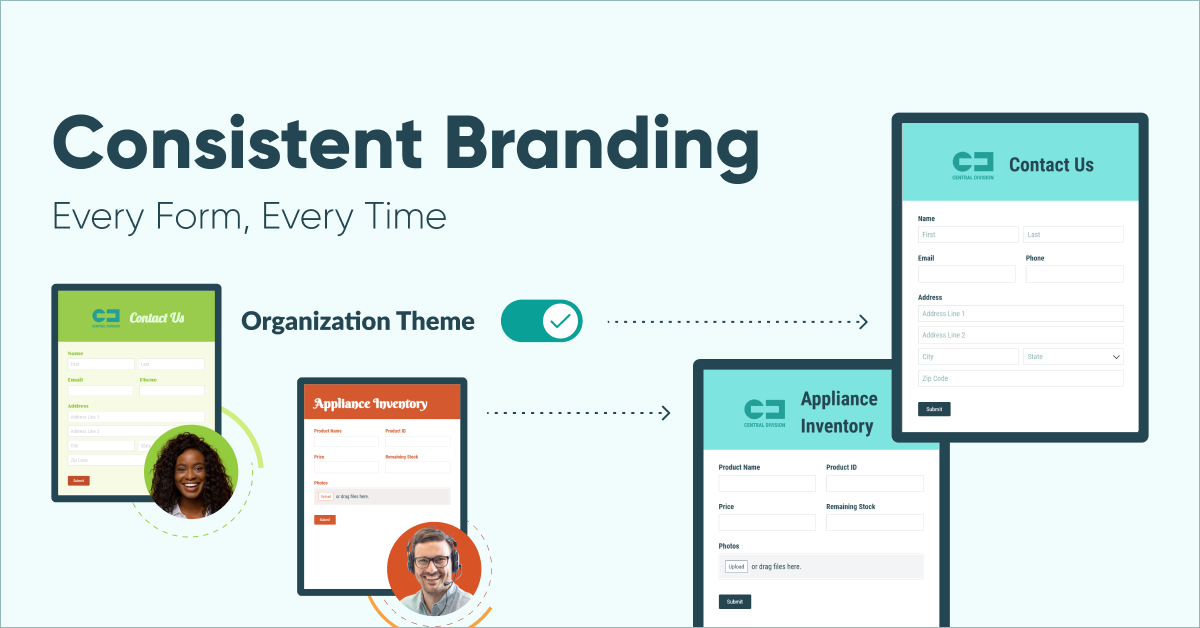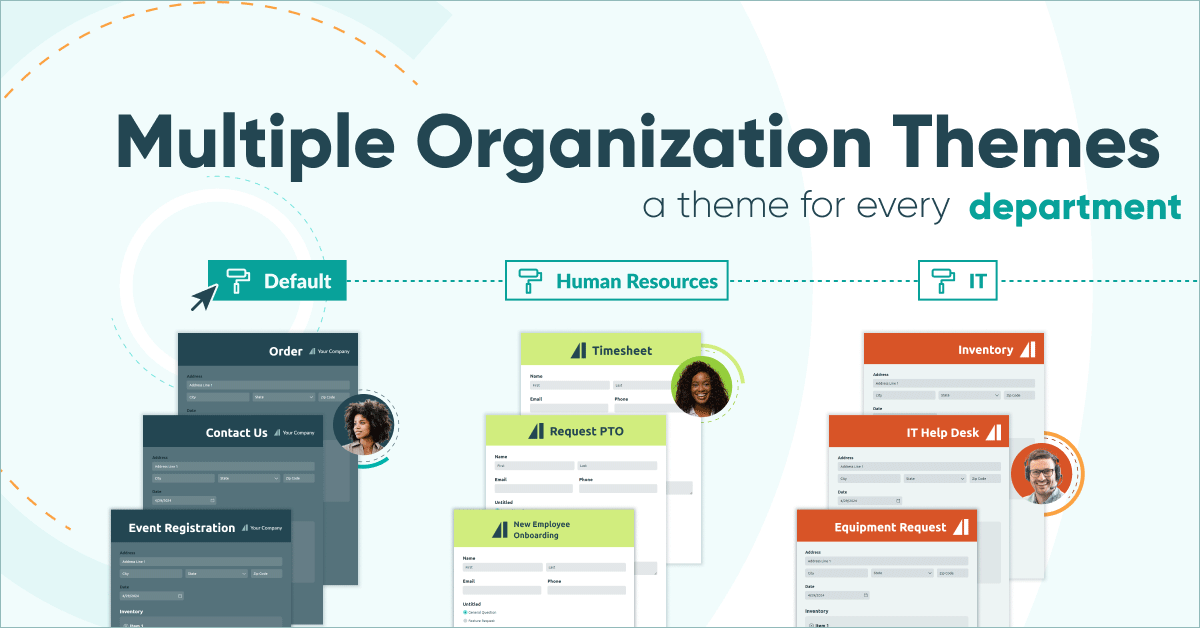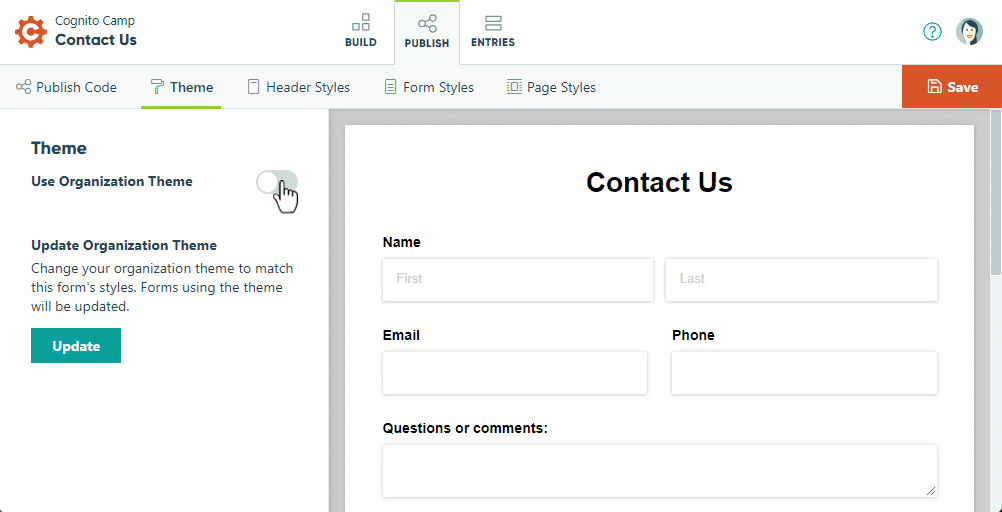Have you ever heard the phrase “consistency is key”? It’s true in life and business. And when it comes to branding, consistency is at the heart of success. It builds customer trust, improves brand recognition, and leads to customer loyalty.
In this article, we’ll delve deeper into the concept of brand consistency and its significance, what it entails, how it benefits your business, and steps to get there with Cognito Forms.
The Challenge of Branding Discrepancies
Organizations often face branding inconsistency, especially as they grow and expand their customer base. Common discrepancies include variations in colors, fonts, and logo size.
Some challenges that may arise with branding discrepancies include:
-
Confusion: When customers encounter variations in your brand’s visual elements, it can lead to confusion and a less-than-favorable experience.
-
Loss of Trust: Inconsistencies can make your organization appear unprofessional and disorganized, leading to a loss of trust.
-
Reduced Brand Recognition: A lack of brand consistency hinders your audience’s ability to recognize and remember your brand, which can be detrimental to growth.
Having a clear understanding of a brand’s identity, values, and mission is crucial for effective communication with customers. To establish a memorable presence in the minds of customers, a business needs to craft a compelling brand story that resonates with consumers and effectively communicates the brand’s essence. This emotional connection is essential for forging long-term relationships with customers.
The Power of Unified Branding
What exactly is unified branding? When someone interacts with a form, your website, or any marketing material, it will look and feel the same across all channels. This recognition is essential for establishing a brand’s identity and distinguishing it from competitors.
Unified branding leads to a cohesive brand identity. It reduces the need to create new branding assets for each marketing initiative and simplifies the design process, saving time and resources. In a Forbes study, 81% of customers make purchasing decisions based on how much they trust a brand. A well-maintained brand can not only develop trust but also encourage repeat interactions.

Unified branding is essential when building online forms, as these forms often serve as touchpoints between your organization and your audience. It takes time and diligence to change the font, color, add the logo, etc., all while making sure it looks uniform.
When Joe from the finance department creates an invoice form and Gladys from the sales team develops a lead generation form, both forms serve as gateways for customer interactions. However, it’s important to recognize that these forms might exhibit stark differences in design and branding if built by different users.
Imagine a customer encountering both forms. The invoice form may sport a professional, watermarked design with specific fonts and colors typical of a financial transaction. In contrast, the lead generation form might display vibrant and dynamic elements, adhering to the sales team’s branding choices.
This inconsistency between the two forms could raise concerns within the customer. It could lead to apprehensions about the security and reliability of the processes behind these forms. After all, a lack of visual cohesion could imply a lack of uniformity in how their data is handled, protected, and processed.
Implementing uniform branding and design elements across all customer-facing forms and digital touchpoints is crucial. This ensures that the customer consistently perceives a professional and secure environment.
Internal Branding Consistency
Most companies focus on external branding, such as developing logos and messages that make them stand out from competitors. But what about internal branding? It’s important to implement a clear identity for your internal brand just as you do for your external brand.
Internal branding involves creating a consistent image or identity for your company or department. Think of a company’s internal brand as their family tree—they are all connected but look a little different from one another. The branch of each tree could include a different department, sector, or group of employees.
Some common pain points experienced by organizations with inconsistent internal branding:
-
Different departments may inadvertently create content that does not align with the brand’s visual or messaging guidelines, leading to a fragmented brand identity.
-
Employees use materials not intended for them, they share outdated documents or content not sufficiently licensed.
-
Lack of coordination can result in inconsistent messaging, which can cause confusion among stakeholders, including customers, investors, and employees.
-
Inconsistent branding can open the door for security and phishing issues among internal email communication channels.
Developing an internal brand can be challenging, but it is worth the effort. A strong brand can engage and motivate employees, foster a positive workplace culture, and set your company or department up for success.
Introducing Organization Themes

Your themes are customizable templates that ensure your branding elements–such as your logo, colors, and fonts remain consistent across all forms in your organization.
Organization themes help you define the look and feel of your forms. In a simple scenario, you may have only one theme for your forms, which could be enough. But, in more complex scenarios, you may want to have more than one theme. Let’s say you want to design a different theme for each department or internal and external themes for employees and customers.
Your themes house a variety of customizable templates for you to choose from–created by trusted members of your organization– removing the friction related to building a new design every time or messing with complex CSS.
Use this feature to:
-
Save time and keep your branding consistent.
-
Optionally require all forms to use a theme.
-
Automatically update every form using the same theme.
Streamline Your Branding

Creating an organization theme is simple and straightforward. Customize your themes to match your organization’s brand identity by selecting different colors, fonts, and form styles and uploading your logo.
Once you create your theme(s), you can apply them to your current forms. And the options are endless! Create up to 25 form themes to unify the look and feel of your organization.
One theme can also be applied as the default setting for new and copied forms. Set up your organization themes now to save time and ensure your brand and online presence are cohesive.

